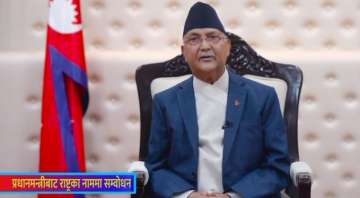Nepal's Prime Minister K P Sharma Oli has said that his government will seek a solution to the Kalapani issue through diplomatic efforts and dialogue on the basis of historical facts and documents.
"We will get back the land occupied by India through holding a dialogue," Oli said while responding to questions in Parliament on Wednesday.
He claimed that India built a Kali temple, created "an artificial Kali river" and "encroached the Nepalese territory through deploying the Army" at Kalapani. The river defines the border between the two countries.
Oli's claim comes in midst of a raging boundary row between the two countries with India sternly asking Nepal not to resort to any "artificial enlargement" of territorial claims after Kathmandu released a new political map laying claim over Lipulekh, Kalapani and Limpiyadhura.
The ties between India and Nepal came under strain after Defence Minister Rajnath Singh inaugurated a 80-km-long strategically crucial road connecting the Lipulekh pass with Dharchula in Uttarakhand on May 8.
Nepal reacted sharply to the inauguration of the road claiming that it passed through Nepalese territory. India rejected the claim asserting that the road lies completely within its territory.
Nepalese officials say that Nepal had control over the area before 1962, when the India-China war took place. At that time India stationed its army seeking permission from then Nepalese rulers for temporary purpose, but it never removed its forces, they claim.
Although there are border issues in other areas such as Susta but the government has given priority to Lipulekh, Kalapani and Limpiyadhura as Nepali territories have not been captured by deploying army in other parts of its international border, Oli said in response to a question in Parliament.
Earlier this week, the Nepalese Parliament unanimously endorsed a proposal to consider a constitution amendment bill to pave way for putting the new political map that includes Kalapani, Lipulekh and Limpiyadhura in Nepal's national emblem.
A discussion on the issue started in the Parliament since Minister for Law, Justice and Parliamentary Affairs Shivamaya Tumbahanfe tabled a bill for the second amendment to the Nepalese Constitution to incorporate the new political map of Nepal on May 31.
Prime Minister Oli said he was happy to learn that the unprecedented unity has been shown both within and outside the Parliament on the issue of national unity and territorial integrity.
"Our ancestors founded and saved this country through their struggles. We will be able to establish our territorial integrity if we remain firm," he said.
Prime Minister Oli also raised objection to Uttar Pradesh Chief Minister Yogi Adityanath's reported remark that Nepal should not repeat the mistake which Tibet made.
"If Adityanath spoke about that, it was not appropriate," he said.
"It is not appropriate to threaten Nepal in that way... This should not have been spoken by a chief minister of UP," he said. "It is a deplorable matter, if he spoke so."
Oli also complained about India's unwillingness to receive the joint report prepared by Eminent Persons' Group (EPG) of India and Nepal.
Nepal is ready to receive the report, but it would be meaningless unless both the governments receive it, he said.
"As per the condition, India should first receive the report but it has not shown any interest to receive the report which was prepared two years ago," he claimed.
Latest World News
